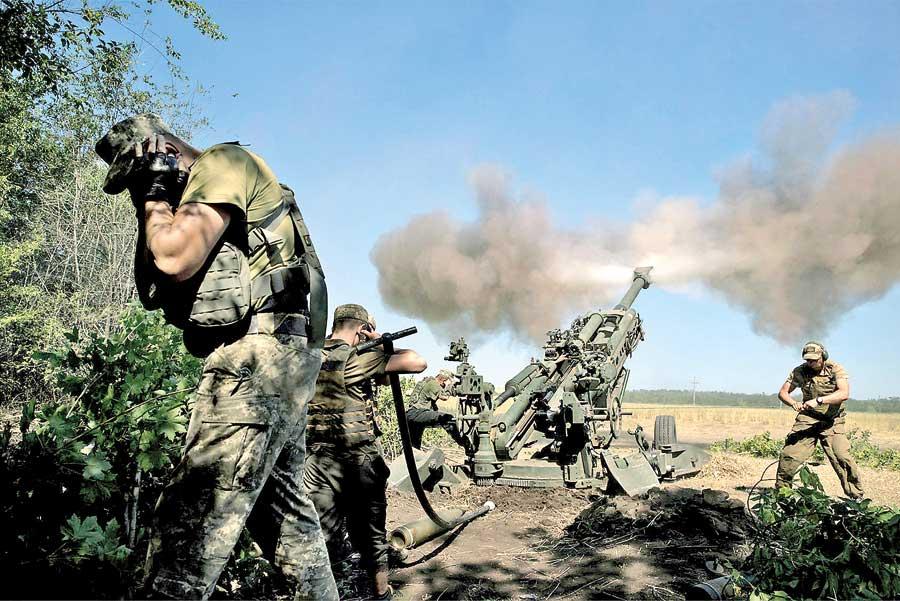Reply To:
Name - Reply Comment

Ukrainians fire at Russian forces in Donetsk province, a target of Russia’s current, narrowed offensive
Social media is agog with fears over a looming Third World War. According to the centre-right Daily Telegraph of the UK, it has already started.
the UK, it has already started.
According to this view, military action in Ukraine and Gaza is only a small part of a global war in which propaganda, influence buying, trade wars and misinformation are weapons as deadly as any conventional or nuclear arsenal.
Third World War scares
But, before we examine this theory in more detail, it’s noteworthy that Third World War scares are hardly new. They have been there almost since the day the Second World War ended.
One could very well describe the Cold War between the West (the US and its NATO allies) and the former Soviet Union and Eastern Bloc satellites as war by other means – both sides vying to outdo each other with misinformation, propaganda and influence buying and trying to bully the other side into submission.
People seem to forget the threat of all-out nuclear war between the two sides. While Soviet nuclear missiles were stacked in Eastern Europe, aimed at West targets, American missiles were stacked in West Germany, aimed at targets in Eastern Europe and the Soviet Union. The US led the nuclear arms race up to the 70s, though the Soviets came close later on. It is estimated that the US produced more than 70,000 nuclear warheads since 1945, more than all other nuclear weapon states combined.
The Cuban missile crisis was a frightening flash point. When satellite images showed Soviet nuclear missiles positioned in Cuba in 1962, President John F. Kennedy issued an ultimatum – take them out or face nuclear war. He wasn’t bluffing. Soviet leader Nikita Khrushchev faced the choice of a humiliating setback or nuclear annihilation – at that time, the Americans had more intercontinental ballistic missiles (ICBMs), more nuclear submarines and more strategic air power. Kruschev chose the former option.
Superpower leaders
Overall, Khrushchev had greater military clout than his 21st-century successor, Vladimir Putin. In 1962, while Soviet Russia would have suffered irreparable damage, he could have devastated the United States, too. But superpower leaders have shied away from the nuclear option (except when the US dropped nuclear bombs on Japan, mainly to avoid an invasion resulting in huge American casualties). When Putin talks today about his nuclear arsenal, he fully understands the consequences of having to use it.
So, the bipolar world fought proxy wars instead – Vietnam, Angola, and Afghanistan. But in Western Europe, fears of nuclear holocaust were real. This spawned a major anti-war movement which had illustrious figures such as British philosopher Bertrand Russel and American film star Jane Fonda prominently figuring in it.
These peaceful protests were tarnished by the centre-right media as communist and pro-Soviet. Interestingly, the same thing is happening today vis a vis the Israel vs Hamas conflict. Protests have sprung across Western Europe and American campuses condemning Israel, and this has been labeled and condemned as an ‘unholy alliance’ between the Western Left and Islamic radicals.
In Russia, Andrei Sakharov, a brilliant scientist called the father of the first Soviet hydrogen bomb in 1953, called for limiting these weapons a decade later – the Atmospheric Test Ban Treaty. He also became the Soviet Union’s most famous dissident and outspoken human rights defender and became the driving force behind the global human rights “boom” of the 1970s. When he began to discuss human rights in the late 1960s, the term was so esoteric that Western journalists often mistranslated it as “rights of man”. His ideas about the link between human rights and international peace won him the Nobel Peace Prize in 1975.
It was Sakharov’s influence and pressure from the anti-war movement which led to the Strategic Arms Limitation Talks (SALT), two rounds of bilateral conferences and international treaties involving the United States and the Soviet Union. There were two rounds of talks and agreements: SALT I and SALT II.
 In Russia, Andrei Sakharov, a brilliant scientist called the father of the first Soviet hydrogen bomb in 1953, called for limiting these weapons a decade later – the Atmospheric Test Ban Treaty
In Russia, Andrei Sakharov, a brilliant scientist called the father of the first Soviet hydrogen bomb in 1953, called for limiting these weapons a decade later – the Atmospheric Test Ban Treaty
Negotiations
Negotiations commenced in Helsinki, in November 1969. SALT I led to the Anti-Ballistic Missile Treaty and an interim agreement between the two countries. Although SALT II resulted in an agreement in 1979 in Vienna, the US Senate chose not to ratify the treaty in response to the Soviet invasion of Afghanistan. The Supreme Soviet did not ratify it either. The agreement expired on December 31, 1985, and was not renewed, although both sides continued to respect it, and SALT led to the STARTs, or Strategic Arms Reduction Treaties -- START I, a 1991 agreement between the United States and the Soviet Union, and START II, a 1993 agreement which never entered into effect.
As such, the Cold War wasn’t a runaway free-for-all. There were checks and balances. But, thirty or forty years ago, there was no shortage of experts expounding on the outcome of a Third World War. There were books written by generals, and there were movies. Most of them focused on a surprise Soviet attack on Western Europe. There was a full-length French feature film about a Chinese invasion of Europe. In the 1984 movie Red Dawn by right-wing director John Milius, teenage students fight a guerrilla war against a combined Soviet-Cuban-Nicaraguan invasion of the US!
But the important fact is that a Third World War did not happen in the bipolar world of two superpowers, the US and the Soviet Union. In today’s multipolar world, with nine countries possessing nuclear weapons -- the United States, Russia, France, China, the United Kingdom, Pakistan, India, Israel, and North Korea, with a total global nuclear stockpile close to 13,000 weapons, the situation is much more volatile.
This is where the media has to be very responsible. Unfortunately, the above-mentioned Daily Telegraph story is closer to Hollywood than factual reportage. All those propaganda and influence-buying wars happened during the Cold War, too, but did not culminate in actual invasions. The Third World War is a possibility, but it has not yet started.